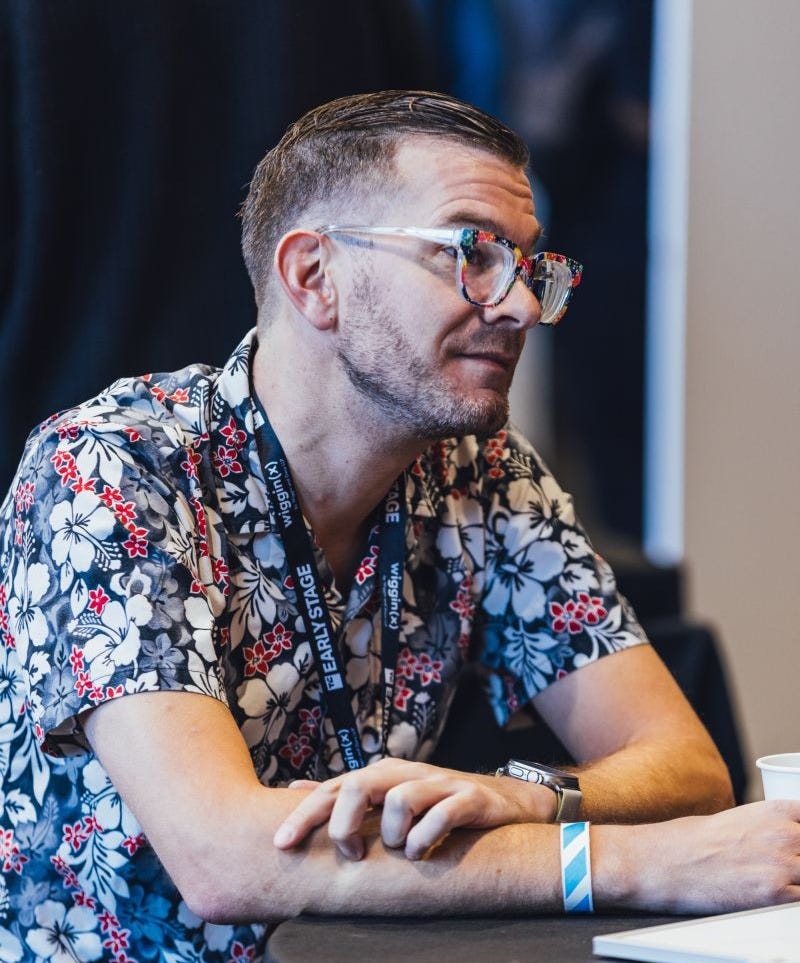🤖 Coverage to Capital x Haje Jan Kamps (part 1): your AI pitch coach has entered the chat
Pitch decks are the calling cards of the startup world. But in a sea of startup stories, how can you ensure yours doesn't sink but swims? We talk to the Pitch Guide founder to learn how AI can help.
When it comes to pitching investors, few people have as varied and insightful a background as Haje Jan Kamps. From his days as a policeman in Shoreditch to becoming a bestselling author, tech journalist and pitch coach, Haje's journey is as unconventional as it is inspiring.
We sat down with him to discuss his latest venture, Pitch Guide, an AI-powered pitch deck review service for early-stage startups. We went long on this one so we’ll be publishing Haje’s interview in two parts.
Haje's path to becoming a pitch expert was anything but straightforward. "I have kind of the world's weirdest background," he admits. After moving from the Netherlands to the UK for a journalism degree, Haje's career took him from magazine writing to TV production, and then, almost by accident, into the world of startups.
For my first company, "I just wanted to do a Kickstarter campaign," Haje recalls. But "you end up having to support it and do more sales and that kind of stuff. I was like, ‘oh crap, there's actually a lot more to this’." Fast forward seven years and the business had shipped around 190,000 units to over 90 countries.
“[I] really fell in love with the high energy and craziness of startups.”
From there, Haje was bitten by the startup bug. “I did an accelerator for Goldman Sachs. I did a Microsoft Ventures accelerator and really fell in love with the high energy and craziness of startups.” He co-founded several companies, including ScreenCloud and a chatbot business aimed at helping people have conversations about death. His experiences eventually led him to venture capital, where he served as director of portfolio for about 70 companies.

The birth of Pitch Guide: AI meets human expertise
It was during his time in VC that Haje discovered his knack for helping founders raise money and tell their stories. This realisation, combined with the changes brought about by the pandemic, led to the creation of Pitch Guide.
When the big generative AI wave hit in 2022, Haje got to thinking, "I sit on this trove of like 3000 pitch decks," he explains. "I wonder if I can pull out some interesting information and statistics using AI." What started as an experiment in AI-powered pitch deck analysis evolved into a comprehensive tool that provides detailed feedback to founders and their teams.
Pitch Guide uses an extensive checklist of around 250 criteria to evaluate decks against. It looks at everything from the basics (like whether there's a team slide, a competition slide…) to more nuanced aspects like “does the competition slide make sense?” Haje explains. “It does a Google search [for competitors] and sees if you’ve selected all of those in your competition slide. And if not, it’s like, hey, it seems like you're missing some incumbents or you're missing some startups.”
The result is a 37-page report that covers every aspect of the deck and provides actionable advice for improvement.
"If you're only raising half a million dollars, it's crazy to spend $20,000 to raise half a million."
One of the most striking aspects of Pitch Guide is its accessibility. At just $15 for an AI review, it's a fraction of the cost of one-on-one pitch coaching services - something Haje also offers for scale-up and later stage VC-backed firms.
"If you're only raising half a million dollars, it's crazy to spend $20,000 to raise half a million," Haje notes. "That just doesn't make sense." Pitch Guide offers a way for early-stage founders to access high-quality pitch advice without breaking the bank.
The secret sauce of storytelling: Why you, why this, why now?
When it comes to creating a compelling narrative for investors, Haje emphasises three key questions: Why you? Why this? Why now?
Why you?: This is about founder-market fit. Are you uniquely qualified to solve this problem?
Why this?: Is the problem big enough and worth solving? Will people pay for your solution?
Why now?: Why wasn't this possible five years ago, and why will it be too late five years from now?
"You lead with what is unique to you," Haje advises. "If you have a unique team, your team slide is the first thing. If you have incredible traction, your traction is the first thing."

Breaking the mold: There's no one-size-fits-all pitch deck
One of the most valuable insights Haje offers is that there's no single "correct" order for a pitch deck. While he has a particular structure he uses as a starting point, Haje says that order "almost never survives" once he starts working with a startup.
He recounts a recent experience where putting the competition slide second in a client’s pitch deck made all the difference. Initially, investors were thrown, “why are we starting with the competition?,” Haje recounts. But this served to differentiate his client in the market. They were able to say “I know we sound like this but we’re not actually that. Let me explain why.” This flexibility and willingness to break convention, based on a startup's unique story, is what sets apart a truly compelling pitch.
In our next issue, we'll dive deeper into Haje's insights on the pitch process, including the importance of understanding your audience and why VCs don’t have an incentive to give founders feedback. Stay tuned for part two!
Want to learn more about the relationship between marketing and fundraising? Download our Coverage to Capital research here.
Want to chat to us for the newsletter? Email us at claire@hardnumbers.co.uk.




